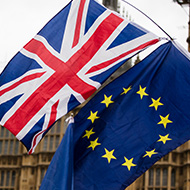Vets set out vision for post-Brexit trade

"We want to see the UK and EU working together closely to grasp the opportunities ahead" - Justine Shotton, BVA president.
The British Veterinary Association (BVA) has set out its vision for making international trade in live animals and animal products run as efficiently as possible.
In a new position statement, BVA outlines several recommendations for decision-makers in the UK and EU for simplifying processes and making assurance systems more efficient. Among these include:
- making better use of veterinary workforce capacity
- exploring support roles for allied professionals working alongside vets, and
- fast-tracking the digitisation of certification processes.
BVA has previously warned over the soaring demand for export health certificates post-Brexit, current shortfalls in capacity, and how this could cause significant problems for the profession.
To ease the burden on the workforce, BVA is calling on the government to work with stakeholders on a plan to ensure that the UK has the required veterinary capacity and that it can facilitate international trade and other essential tasks.
The organisation is also calling on the government to explore opportunities for making better use of allied professionals, including certification support officers, for supporting the work under the direction of veterinary teams.
It recommends steps to simplify the process of veterinary certification and a need for vets and businesses receive clear guidance on transitioning to digital processes.
The position also highlights a need for a strong collaboration between the UK and the EU and for the government to engage with vets, farmers and processors to pinpoint opportunities to simplify trade requirements.
Finally, the position highlights a requirenment for Great Britain to set its own imports regime that meets its own biosecurity needs, adding that delaying or cancelling the introduction of import checks could “wreak havoc” for disease prevention.
BVA president Justine Shotton, said: “In launching our position today, we’re bringing together the collective wisdom of many people working within and alongside the veterinary profession to keep trade running smoothly and to high health, welfare and safety standards. We want to see the UK and EU working together closely to grasp the opportunities ahead, as well as acknowledging and ironing out some of the considerable issues we face in terms of capacity and making the most of existing resources.
“The UK government is making some welcome steps in the right direction to maximise resources and make systems more efficient, including introducing a certification support officer role and putting digitisation high on the agenda. Going forward into what is new and uncharted territory, it’s vital that they continue to engage closely with vets, who are so central to the process and our future success on the global stage.”



 The Veterinary Medicines Directorate (VMD) is inviting applications from veterinary students to attend a one-week extramural studies (EMS) placement in July 2026.
The Veterinary Medicines Directorate (VMD) is inviting applications from veterinary students to attend a one-week extramural studies (EMS) placement in July 2026.